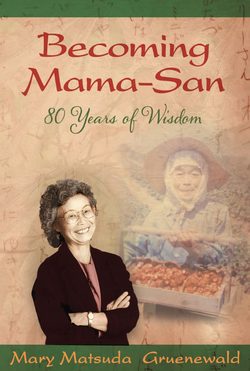Читать книгу Becoming Mama-San - Mary Matsuda Gruenewald - Страница 8
На сайте Литреса книга снята с продажи.
PROLOGUE Becoming Mama-san
ОглавлениеIt was a perfect midsummer evening on Vashon Island, a short ferry ride from Seattle, and Mount Rainier was glowing a beautiful pink to the southeast of our farm. This was the very best time of the year for Mama-san and I to savor the beauty of the fields, when the harvest was complete and we had time to reflect. She liked to pass on her appreciation for life during our walks.
“I am so grateful that the harvest went well this year,” she said, in her formal Japanese. “Do you remember how hard the four of us worked this spring?”
From where we were standing, we could look around and see all ten acres of our farm. Tidy rows of strawberry plants covered gently rolling hills. Our modest farmhouse stood in one corner of the property, with the barn nearby.
“I am very proud of how well you and Yoneichi-san worked together,” Mama-san added. “Now, you can see that it all paid off.”
She sighed with contentment as her eyes swept over the landscape. Her smile was all I ever needed to feel secure and seen.
As we turned to continue our walk, a flash of red in the next row over caught my attention. I bent down and parted the green leaves. “Look, there’s one for each of us.”
I handed her the larger of the two, last-of-the-season berries and we ate them, nodding at each other.
My mother, Mitsuno Horie Matsuda, was the kindest, wisest person I have ever met. I spent my childhood wanting to please her. As a young adult, I rebelled against her, and against her culturally-based expectations for me. More recently, and especially since her passing in 1965, I have tried to become as much like her as I possibly can.
Mama-san was born in 1892 in Japan, a proud and ancient culture. In 1922, she married my father and came to America, intending to live and die here. In Looking Like the Enemy, I wrote of how my mother’s wisdom rescued me from the depths of despair during my most challenging times in the Japanese-American concentration camps. In the most difficult of circumstances, she remained amazingly resilient and optimistic, even while those around her felt hopeless. When my publisher asked me to write another book, I knew that my mother would be its focus.
Mama-san’s wisdom developed and deepened while she raised a family, earned a living through hard physical labor, and faced severe discrimination in her adopted country. It was only as I pondered the materials for this book that I came to fully appreciate the elegance of her beliefs and how important a role model she could be—not just for me, but for others as well. As I observe the 21st century begin to unfold, the power of her message from the 19th century seems more applicable than ever.
—MARY MATSUDA GRUENEWALD
January 2013
